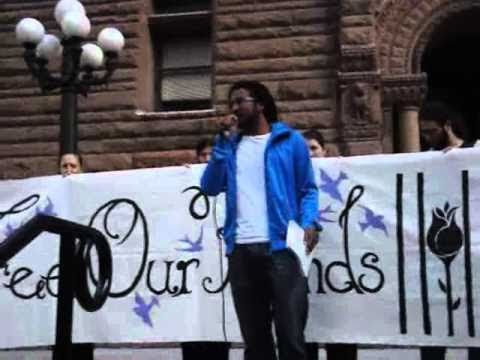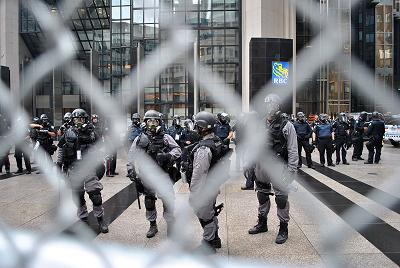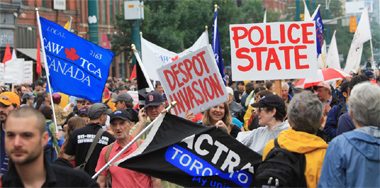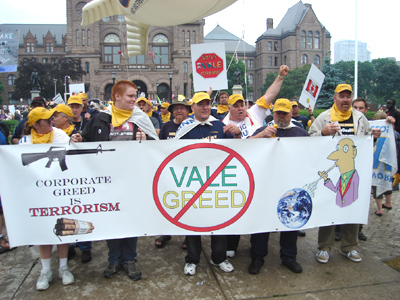City Under Siege: The University of Toronto Joins the G20 Security Ring
On Friday afternoon, right before the May 24th holiday weekend, Cheryl Misak, Provost of the University of Toronto quietly released a memo to departmental administrators. The memo, entitled “G20 Summit: Restricted Access on St. George Campus,” describes a “series of restricted access measures” for the University’s main campus. These include rescheduling summer exams, moving students to temporary housing off campus, and canceling all planned events.
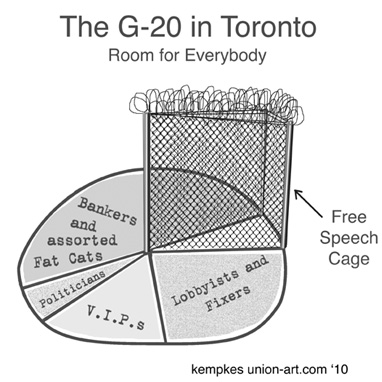
While disappointing, this announcement comes as no surprise. As Ontario gears up to host both the G8 and G20 Summits at the end of June – in Huntsville and Toronto, respectively – security spending has skyrocketed to precarious heights that even the Liberals are denouncing. Just four days after the University of Toronto made its stealthy announcement, the Federal government revealed its plans to commit an additional $645-million dollars to securing the Summits, bringing the total to almost a billion dollars.
Whose Campus? Our Campus?
People gathering to protest such Summits have long been met with locked-down cities and state violence, and since the heyday of the anti-globalization movement, we have witnessed a revolution in crowd-control strategy that makes dissent increasingly difficult and dangerous. Summits are often held in remote locations, and cities that host Summits are converted to militarized zones with massive physical barricades, checkpoints, air surveillance, and a host of weapons to release on protestors – including the most recent weapon of war to be unleashed domestically, the sound cannon.
Despite this escalation over the past decade, it seems that Prime Minister Stephen Harper plans to do it bigger and better. Security spending for the looming Summits is unprecedented globally. Even at the 2001 Summit of the Americas in Quebec City, in the shadow of Seattle, security costs amounted to $100-million for what was at the time the largest security operation in Canadian history. This spending record will be again broken at the end of June when the biggest deployment of security forces in the country’s history is unleashed.
At the University of Toronto, the Provost’s decision to close campus during the Summits will have serious effects on the work of students and staff, neither of whom were consulted about the decision. According to the University, the reason for the closing is the location of a “designated protest zone” at Queen’s Park North, which is on the “doorstep of the St. George Campus.” The university claims to respect “the legitimacy of peaceful protest.” But it perceives the threats to students and staff “who do not wish to participate or get caught up in these protests,” to be simply too great. Among the threats associated with the protests, the memo identifies, “violence, tear gas, arrests, disruption and damage to buildings.” It also referred to the example of Pittsburgh, where violent police actions during the last G20 Summit took a horrific legal and physical toll on students at the University of Pittsburgh.
In light of what occurred in Pittsburgh and the past actions of the University of Toronto Administration, the decision to close campus seems, at best, disingenuous. At worst, and more likely, it is a strategic decision on the part of the University to deny access to resources and sanctuary to those who wish to protest the G20 – many of whom are the very faculty, students, and staff the Administration is purporting to protect. The University, supposedly a place of public debate, has instead expelled its students and staff and the public beyond its gates, leaving them at the mercy of the heavily armed security forces bearing down on Toronto. The University has joined with the planners of the G20 in their effort to silence dissent and protest.
What Happened at the University of Pittsburgh?
Last September we visited Pittsburgh during the G20 Summit. What we saw was instructive. On the first evening of the Summit, students and protesters massed on the University of Pittsburgh’s campus to gawk at the hundreds of riot cops and National Guard who stood between them and the world’s most powerful leaders. While leaders dined on sumptuous ‘locavore’ cuisine in a hillside botanical conservatory, on the other side of a wide ravine, students and protestors socialized and occasionally taunted the police. As the night wore on, without notice, the police began to beat on their glimmering polycarbonate shields. They quickly closed in on, and arbitrarily detained members of the crowd. Using this tactic, they slowly reduced the crowd, which willingly dispersed around 9:30 pm.
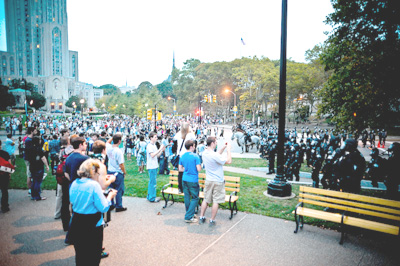
On the second evening of the Summit, students and protestors gathered again on campus, this time to protest the arbitrary police brutality they had witnessed the night before. The images and accounts of that Friday evening are nothing short of terrifying. It began joyfully. Students and protestors mingled, danced, and played a game of duck-duck-goose. At 10:30 pm the Pittsburgh Police issued an eerie, prerecorded order to disperse. The recording warned, “no matter what your purpose is, you must leave,” failure to do so would result in the use of “riot control agents and/or less than lethal munitions.” Moments later, the Police closed in, arresting anyone who lay in their path. Among the 110 arrested were numerous disoriented bystanders, a jogger, and several journalists. Bound with zip ties, the bewildered detainees were harassed by police, charged, and detained overnight. Most of these charges were later dismissed.
But it did not end there. The Police continued to move through the campus leaving bloodied and detained students in their wake. One shocking video showed a young student bleeding from her face after being hit by an OC gas canister. Police invaded and gassed dormitories. In a moment eerily reminiscent of Abu Ghraib, a group of visiting police from Chicago forced a detained protestor to his knees and gathered behind him for a group photo. The Pittsburgh Post-Gazette reported that police posed for photos with women detainees in their custody. All of this violence took place to disperse a peaceful gathering located miles from the G20 Summit.
What happened that day in Pittsburgh remains a source of fierce debate among local students and activists. The University of Pittsburgh did not stand in defense of its students. Administrators idly watched as phalanxes of police descended on campus and arrested students in their homes, without cause. Unsurprisingly, the city’s Democratic political machine has never criticized the politically powerful Police Department. Instead, the Mayor and most of city council proudly celebrated their ability to secure the city for world leaders. The Pittsburgh Police Department has repeatedly stymied the Citizens Police Review Board in its attempt to obtain records of these police actions.
What’s Happening at the University of Toronto?
So, in light of what happened in Pittsburgh, is the University of Toronto acting in defense of its students and staff? Evidence suggests otherwise. The University’s memo identifies protestors as the main threat to safety, not the police. This assessment ignores the fact that, in Pittsburgh, the only ‘violence’ carried out by protestors took the form of a few broken windows. Meanwhile police routinely injured both protestors and non-protestors alike. At the G20 in London, police even killed a bystander. If the University really wanted to protect its students and staff, it would keep the Police off its campus. The University of Toronto is not expelling Police from its campus; it is inviting them in.
Despite claims to the contrary, the University of Toronto, like the G20, is not an advocate of either democracy or peaceful protest. A byzantine Governing Council dominates decision-making at the University. Combined President David Naylor and the Lieutenant Governor of Ontario appoint 18 of the 48 councilors. Of the remaining seats, 12 are elected by teaching staff, 8 by alumni, and 2 by non-teaching staff. Last, and definitely least, 8 seats are left to represent 71,000 students.
In a city and a university with a large immigrant population, the Governing Council forbids the membership of non-Canadian citizens. A sycophantic chamber of horrors, it functions to silence dissent among its few vocal student members. It limits attendance to fifteen non-members who must remain silent during its proceedings. Campus police stand guard by the door and the Council has prepared an elaborate plan to deal with any disruption including a protocol to call outside law enforcement to remove protestors.
The University’s professed love of peaceful protest must come as a surprise to the fourteen students and staff, the Fight Fees 14, who were arrested during a peaceful protest against fee increases in March 2008. The University of Toronto not only invited police onto campus to arrest the protestors, but it also charged them under its Code of Student Conduct, its favourite tool for stifling and criminalizing dissent among vocal students.
So how should we understand the University’s decision to shut its doors for a week of June – to expel its students and staff and barricade itself off from the outside world? Sadly, this is typical of an institution where the support of peaceful protest and free speech are nothing more than well-worn clichés. The University of Toronto has always been a bastion of Canada’s ruling class. It is one of Canada’s most conservative universities: an institution that has schooled many of the country’s elite, that has long stifled dissent, that has played a primary role in defending neoliberalism.
So unsurprisingly the Provost’s recent memo confirms that the University Administration clearly fears students, protestors, and the world outside its gates. Like the University of Pittsburgh, it will welcome police to its campus who will restrict political speech and commit acts of violence against the communities that the University is supposed to serve.
So once again, as the state criminalizes protest before it even happens, and as the mainstream media teaches fear to its readers, the University of Toronto is right along side them – telling the archaic story of ‘police versus protesters,’ quashing dissent and discussion, and threatening the safety of its own students and staff by equating protest and protestors with violence. The campus closure is part of the now standard Summit security practice of bringing a city under siege. But we should expect more from one of Canada’s largest institution of higher learning. We should expect the University of Toronto to create space for dissenting views, to allow its students to organize and speak out against the G20, to encourage its students to be the citizens it claims to create. Instead, on June 23rd, like any elite out of touch with the masses outside the gates, the University’s leaders will call for barricades and pack the car for the cottage. •
—Please Circulate Widely—
The following letter is endorsed by campus organizations, labour unions, and faculty calling on the University of Toronto to rescind its decision. Please consider signing this letter. You can do so by sending an email to open.uoft.campus@gmail.com. Thank you for your support and solidarity.
University of Toronto community opposes campus closure during the G20:
Decision to “restrict access” heavy-handed and repressive
The decision to close the University of Toronto St. George campus during the G20 Summit – the week of June 21-27 – contradicts the purpose of the university, reinforces harmful stereotypes of protesters, legitimizes police repression and violence, and does not reflect the wishes of students, staff and faculty.
Universities are sites for critical engagement and debate. The University of Toronto, as a place of higher learning, should be encouraging dialogue and engagement on the role of the G8/G20 and the future of our planet. Instead, administrators are prohibiting access to the campus, stifling dialogue and fostering a climate of fear.
According to a May 21st memo, the campus closure is necessary because of the “designated protest zone” at Queen’s Park. Playing into media hype, University administrators have chosen to focus on a crude “protesters vs. police” characterization of anti-G20 efforts, and entirely sidestep the issues that compel people to oppose the G20 and its policies. In so doing, they reinforce cynical stereotypes of protesters and legitimize police violence.
The University did not consult students, staff, or faculty in making this decision. This decision places an unacceptable and unnecessary burden on students, instructors and researchers, forcing them to postpone their research, alter their course and exam schedules, and even abandon their homes.
For these reasons, we call on Provost Cheryl Misak and President David Naylor to immediately rescind their decision to close the campus during the G20 Summit. We invite campus community members and organizations to join us. To endorse this statement, please send an email to open.uoft.campus@gmail.com.
Signatories
- University of Toronto Students’ Union
- Canadian Union of Public Employees, Local 3902
- United Steelworkers, Local 1998
- U of T Association of Part-Time Undergraduate Students
- Ontario Public Interest Research Group – U of T
- The Centre for Women and Trans People – U of T
- Graduate Geography and Planning Student Society – U of T
- Les Étudiants Francophones de l’Université de Toronto (French Club – EFUT)
Faculty Signatories
- Kari Dehli, Chair, Sociology and Equity Studies in Education, OISE
- Scott Prudham, Associate Professor, Department of Geography, Vice-President, University of Toronto Faculty Association (UTFA)
- Bahar Biazar, Department of Adult Education and Counselling Psychology, University of Toronto
- Deborah Cowen, Assistant Professor, Department of Geography and Programme in Planning, University of Toronto
- Ken MacDonald, Assistant Professor, Department of Geography and Programme in Planning, University of Toronto
- Emily Gilbert, Associate Professor, Department of Geography and Canadian Studies Program, University of Toronto
- Katharine N. Rankin, Associate Professor & Director of Planning, Department of Geography, University of Toronto
- Rachel Gorman, PhD. Undergraduate Coordinator, Women and Gender Studies Institute, University of Toronto
- Kanishka Goonewardena. Associate Professor, Department of Geography and Programme in Planning, University of Toronto
- Sarah Wakefield. Associate Professor, Department of Geography and Programme in Planning, University of Toronto
- Matthew Farish, Assistant Professor, Department of Geography and Programme in Planning, University of Toronto
- Ernie Lightman, Professor, Faculty of Social Work, University of Toronto
- Rinaldo Walcott, SESE OISE, University of Toronto
- Andre Schmid, Associate Professor, Dept. of East Asian Studies, University of Toronto
- Robert Lewis, Professor, Department of Geography and Progamme in Planning, University of Toronto
- Paul Downes, Associate Professor, Department of English, University of Toronto
- Nicholas Sammond, Associate Professor, Cinema Studies Institute/Department of English, University of Toronto
- Margrit Eichler, Professor, Department of Sociology and Equity Studies in Education, OISE, University of Toronto
- Corinn Columpar, Associate Professor, Cinema Studies and English, University of Toronto
- John P. Valleau, Professor Emeritus, Department of Chemistry, University of Toronto
- Emily Eaton, Assistant Professor, Department of Geography, University of Regina
- Reecia Orzeck, Assistant Professor, Department of Geography, University of Vermont
- David McNally, Professor, Political Science, York University
- Helen Colley, Professor of Lifelong Learning, Manchester Metropolitan University, UK
- Irma Molina, Post Doctoral Fellow, Social Anthropology, York University
- Marie-Josée Massicotte, Associate Professor, School of Political Studies, University of Ottawa
- Mark J. Goodman, Department of Sociology and Department of Equity Studies, York University
- Laam Hae, Assistant Professor, Department of Political Science, York University
- Harald Bauder, Associate Professor, Department of Geography, Ryerson University
- Greg Albo, Department of Political Science, York University
- And others…..[updated list]


